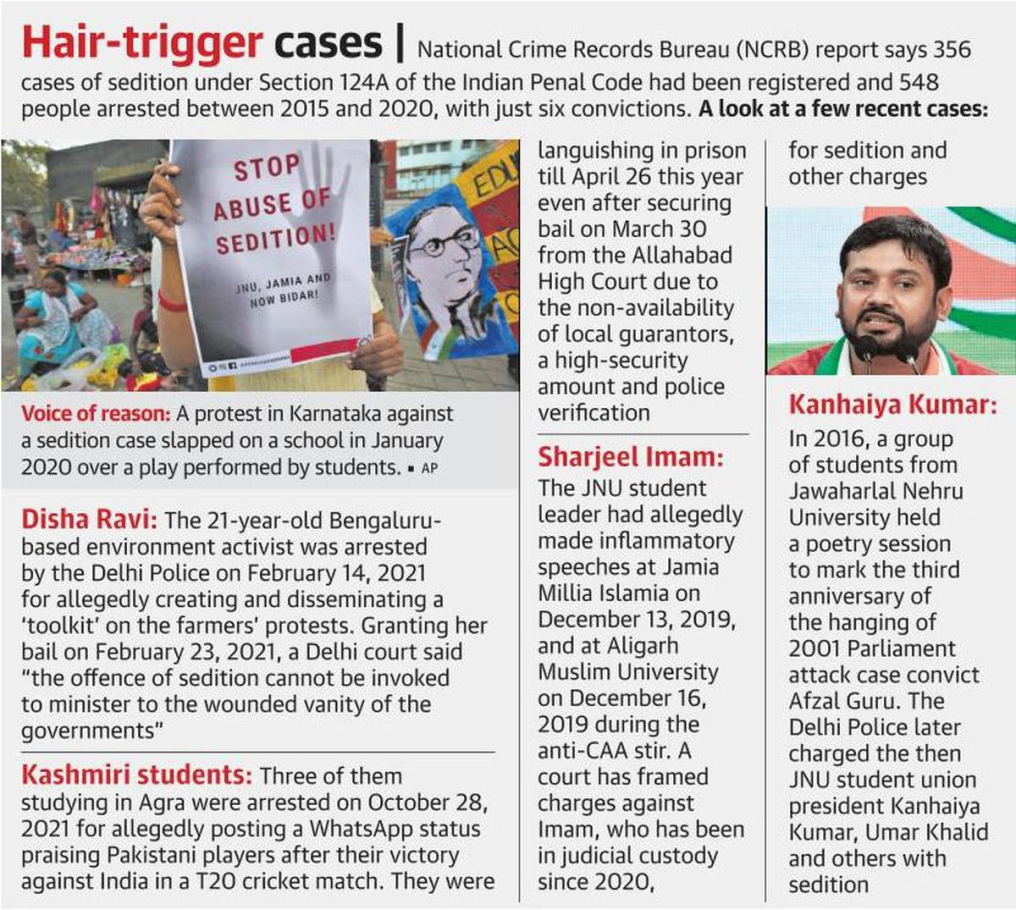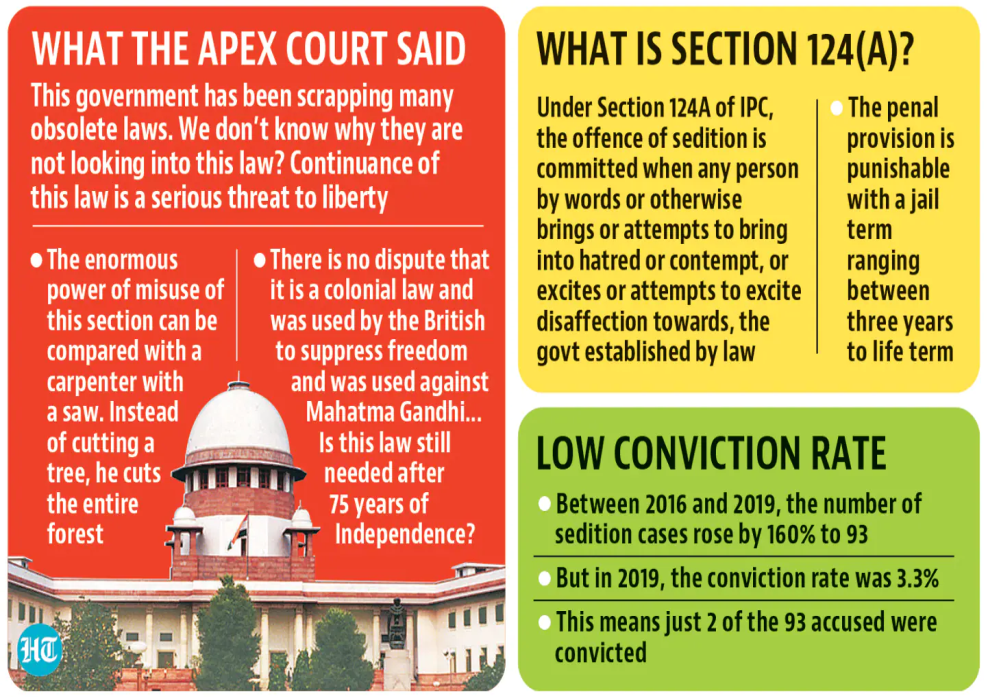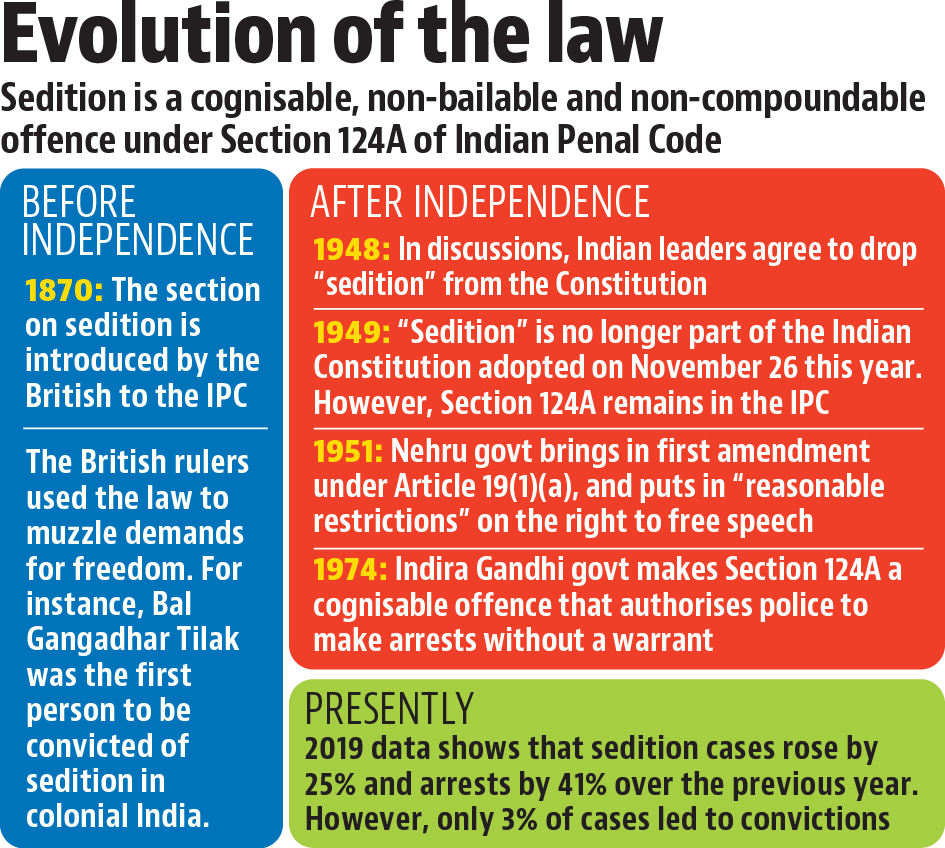Description

Copyright infringement not intended
Context - The Supreme Court of India has suspended all the pending criminal trials under Section 124A and allowed the Union Government to reconsider the law.
Details
- The Supreme Court suspended all the pending criminal trials and court proceedings under Section 124A (sedition) of the Indian Penal Code and allowed the Union government to reconsider the sedition law.
- The court has made it clear that the Centre and States to restrain from registering FIRs, continuing investigations or taking coercive measures under Section 124A while the “reconsideration” of the colonial provision was on.
- The Ministry of Home Affairs highlighted that the Government always expressed unequivocal views in favour of the protection of civil liberties, respect of human rights, and giving meaning to the constitutionally cherished freedoms by the people of the country.
- In the 1962, Kedar Nath Singh case, the Supreme Court upheld the validity of the sedition law while attempting to restrict its scope for misuse.
- It had held that unless accompanied by incitement or a call for violence, criticism of the government cannot be construed as a seditious offence.

Copyright infringement not intended
Sedition law
- It was Drafted by Thomas Babington Macaulay in 1837.
- According to the Macaulay draft, Sedition was defined as an act by ‘whoever, by words, either spoken or written, or by signs, or by visible representation, or otherwise, brings or attempts to bring into hatred or contempt, or excites or attempts to excite disaffection towards the Government in India’.
- The Sedition charge was included under Section 124 A of the Indian penal code in 1870.
- It was imposed by the British Colonial government to mainly suppress the writings and speeches of Indian freedom fighters.
- The Writings of Mahatma Gandhi, Lokmanya Tilak, Jogendra Chandra Bose etc, were suppressed and they were punished under sedition law for their statements on British rule.
- As per Section 124A of IPC, sedition is a non-bailable offence.
- It is punishable with imprisonment from 3 years up to a life sentence, along with a fine or both.
- A person charged under sedition law is also banned from a government job and their passport is seized by the government.
- The sedition charge was abolished by the United Kingdom government in 2010.

Copyright infringement not intended
Concern
- According to the Kedar Nath judgment in 1962, the sedition law was supposed to be applied in rare cases where the security and sovereignty of the country are threatened.
- However, there are growing examples to show that this law has been used as a tool against political rivals, to suppress disagreement and free speech.
- As per the latest data, more than 25 sedition cases were filed after the anti-Citizenship Amendment Act protests, nearly 22 after the Hathras gang rape, and 27 after the Pulwama incident.
- In all, 96% of the sedition cases filed against 405 Indians over the last decade were registered after 2014.
- The conversion rate in these cases is only 3%.
- The low conviction rate shows that the police and state authorities are using the sedition laws to create fear amongst the citizens and to silence any criticisms or disagreement against the people in power.
- The main problem with the sedition law is that it is poorly defined. The terms “bring into hatred or contempt” or “attempt to excite disaffection” can be interpreted in many ways and this empowers the police and government to harass innocent citizens.
- Due to its poor definition, sedition law can be used by the police to falsely accuse individuals as it does not state which acts are seditious and provides a broad outline of what can be classified as seditious.
Way Forward
- The Constituent Assembly of India opposed the inclusion of sedition as a restriction on freedom of speech and expression.
- The constitution makers had sawn the sedition provision as a shadow of the colonial mindset that should not exist in free India.
- But still, it is continuing under section 124A of the IPC.
- The Law Commission report highlighted that;
- In a democracy, singing from the same songbook is not a benchmark of patriotism.
- People should be allowed to show their affection towards their country in their way.
- A democracy needs constructive criticism or debates, pointing out the loopholes in the policy of the Government is important for the existence of a democratic Nation.
- Expressions used to criticize the government might be harsh and unpleasant to some, but that does not cause the actions to be branded seditious.
- The Law Commission has suggested that the sedition law under section 124A should be invoked only in cases where the intention behind any action is to disrupt public order or to overthrow the government with violence and illegal means.
- The Law Commission suggests that section 124A of IPC (sedition) must remain; however, it should be scrutinised whether the word ‘sedition’ could be substituted suitably with another.
- On many occasions, the Supreme Court had highlighted that the Expression of views which is in disagreement and different from the opinion of the government cannot be termed seditious.
- Need to the hour is to find a balance between sedition and the right to freedom of speech, and install safeguards against misuse of the sedition charge.
https://epaper.thehindu.com/Home/ShareArticle?OrgId=G5V9Q6HE0.1&imageview=0















